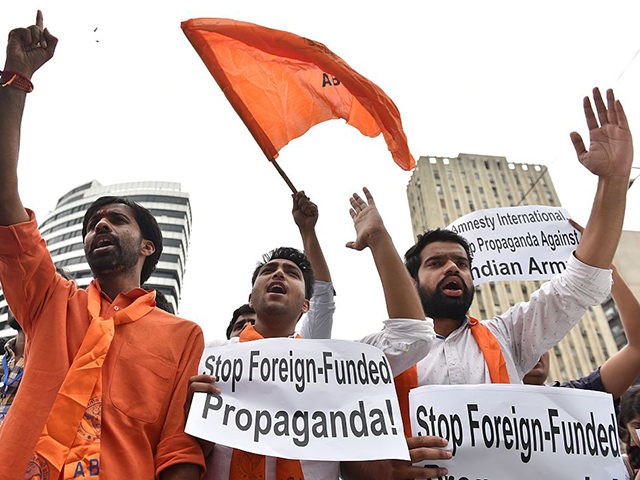Amnesty International announced on Tuesday that it would cease operations in India after the federal government froze its bank accounts pursuant to an investigation into allegations that the human rights organization was funneling foreign funds to itself illegally.
Amnesty leaders in the country called accusations of “illegalities” from the government of Prime Minister Narendra Modi “egregious and shameful,” claiming the current administration is on a “witch hunt” against the group for exposing human rights violations in the country. Amnesty International’s reports have repeatedly accused Indian police of brutality against rioters and opposed India’s moves to expand its power over Jammu and Kashmir, a territory it disputes with Pakistan.
Indian officials responded to Amnesty’s impassioned declaration that it would leave the country by reaffirming that evidence exists suggesting financial improprieties on the organization’s behalf.
“Treating human rights organizations like criminal enterprises and dissenting individuals as criminals without any credible evidence is a deliberate attempt … to stoke a climate of fear and dismantle the critical voices in India,” Avinash Kumar, the executive director of Amnesty India, said in a statement on Tuesday. “It reeks of fear and repression, ignores the human cost to this crackdown, particularly during a pandemic, and violates people’s basic rights to freedom of speech and expression, assembly, and association guaranteed by the Indian Constitution.”
“This is an egregious and shameful act by the Indian Government, which forces us to cease the crucial human rights work of Amnesty International India for now,” the acting secretary-general of the group, Julie Verhaar, said. “However, this does not mark the end of our firm commitment to, and engagement in, the struggle for human rights in India. We will be working resolutely to determine how Amnesty International can continue to play our part within the human rights movement in India for years to come.”
Verhaar applauded her workers on the ground in India for resolve in the face of what she called a “concerted and vicious smear campaign of spurious allegations, raids by various investigative agencies, malicious media leaks, and intimidation without an iota of credible evidence of wrongdoing.”
“No laws have been broken,” Verhaar asserted.
The Indian Ministry of Home Affairs responded to the remarks from Amnesty leaders by dismissing the accusations as “glossy statements” and stating that the group was engaging in “illegalities” when the government froze its bank accounts.
“All the glossy statements about humanitarian work and speaking truth to power are nothing but a ploy to divert attention from their activities which were in clear contravention of laid down Indian laws,” a government spokesman said. “Such statements are also an attempt to extraneously influence the course of investigations by multiple agencies into the irregularities and illegalities carried out over the last few years.”
“Amnesty is free to continue humanitarian work in India, as is being done by many other organizations. However, India, by settled law, does not allow interference in domestic political debates by entities funded by foreign donations,” the statement continued. “This law applies equally to all and it shall apply to Amnesty International as well.”
Human Rights NGOs like Amnesty International need legal approval, through the Foreign Contribution Regulation Act (FCRA), to accept foreign funds in Indian bank accounts, government officials asserted. Amnesty is only on paper having received a one-time approval for foreign funds in 2000. Indian government investigators allege that Amnesty officials used related corporate entities to accept foreign money without having to ask the Home Affairs Ministry for permission, a violation of the law.
“Any organization can function in India, but it has to be within its legal ambit. Wearing a veil of honesty and acting in bad faith is not something we will permit to Indian or foreign organizations,” he said.
India’s The Print reported on Tuesday that, despite the allegations directed at Amnesty International, the criminal investigation by the Enforcement Directorate, the agency in charge of confirming financial improprieties, remained focused on the other corporate entities that allegedly received foreign funding. The outlet identified the two groups as Amnesty International India Pvt Ltd and Indians for Amnesty International Trust and claimed that the larger Amnesty International group is not facing a criminal probe for now.
Prior to its departure from the country, Amnesty’s India wing had regularly published what it claimed to be evidence of human rights abuses by the Modi government. Most recently, the group published a report detailing alleged police abuses against rioters in Delhi, including “Delhi police officers indulging in violence with the rioters; torturing in custody; using excessive force on protesters; dismantling protest sites used by peaceful protesters and being mute bystanders as rioters wreaked havoc.”
Amnesty International has also regularly objected to Modi revoking the special semi-autonomous status previously afforded to Jammu and Kashmir.
“Over the last one year the Government of India has been systematically dismantling all avenues for justice for the people of Jammu and Kashmir,” Kumar, the head of Amnesty India, wrote in August. “With zero representation, protracted internet restrictions, arbitrary use of some of India’s most stringent laws, verbal orders of detention and crippling of the local media — most of this disproportionately higher in Kashmir — it’s been a complete year since we have heard the people of Jammu and Kashmir speak.”

COMMENTS
Please let us know if you're having issues with commenting.